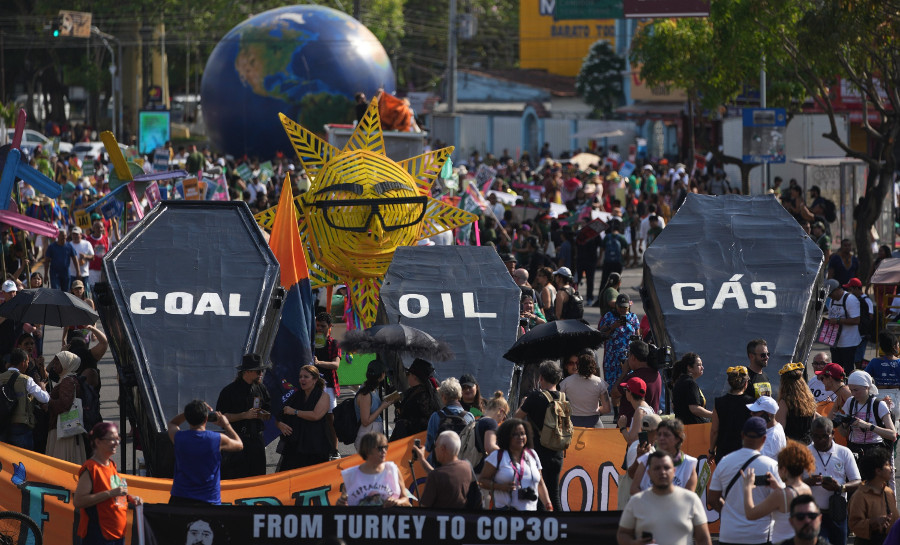|
Brazil: Environmental or development policy? Brazil and COP30 The Lula government views COP30 as a strategic platform to strengthen the country's international standing after a period of isolationism and climate denial under the previous administration, and to position it as a key player in the energy transition and international climate policy. In this context, strategic minerals, including rare earth elements, are becoming bargaining chips in international relations, such as in the dispute with the United States, which attempted to impose unilateral tariffs on Brazilian products while simultaneously pushing for privileged access to raw materials. The Brazilian government's decisive response was intended to reaffirm national sovereignty, which had historically been undermined by the promotion of foreign mining interests (including through the Brazilian Development Bank, BNDES). At the national level, COP30 serves as an instrument of political and electoral legitimacy. The government links the event to promises of green prosperity, job creation, and regional development, particularly in the north and northeast of the country. In doing so, it reinforces the narrative of the supposed compatibility of economic growth, social justice, and environmental sustainability. However, the expansion of agribusiness, extractive infrastructure, and strategic mining continues to generate socio-ecological tensions. For example, the agricultural sector is gaining increasing political influence and benefits from tax breaks that tie up vital resources—such as the budget of the Ministry of the Environment. Thus, despite the rhetoric of climate policy leadership, practice reveals significant contradictions. The intensive extraction of strategic minerals keeps the country dependent on global value chains, and Brazil's energy transition perpetuates the extractive development model that breeds territorial conflicts and human rights violations. While Brazil aims for a central role at COP30, it also seeks a leading position within the G77, the group of developing countries within the United Nations. There, government representatives are attempting to unite the interests of the Global South in the spirit of a just, multipolar policy and are advocating for reform of the international financial system and the reduction of asymmetries between industrialized and developing countries . With its tradition of cooperative diplomacy and institutional capacity, Brazil presents itself as a bridge between historical demands (such as the financing and transfer of key technologies) and new global agendas like the energy transition and the reduction of social inequalities. Participation in the G77+China conference in Havana, as well as the representation of these issues in broader forums such as the G20 (the group of the 20 most economically important nations) and the BRICS (Brazil, Russia, India, China, and South Africa), reflects Brazil's return to the international stage after years of diplomatic restraint and isolation. Within the BRICS framework, Brazil strives for strategic autonomy and seeks to reconcile rapprochement with rising powers while remaining integrated into traditional institutions . The country adopts a moderating role, advocating for multilateral policies and South-South cooperation, while simultaneously avoiding excessive polarization with the West. Participation in the group strengthens its complementarity with the G77 and allows Brazil to consolidate its leadership role, which is based on dialogue, consensus-building, and the commitment to a more inclusive and balanced international system. Civil society between cooperation and confrontation With COP30 just weeks away, the Lula government is enjoying growing popularity, while the far-right leaders associated with Bolsonaro are increasingly losing ground. According to polls, 48 percent of voters believe the government has handled the so-called "Tarifaço," the tariff dispute with the US, well . The decline of the right is further exacerbated by the Supreme Court's historic sentencing of Jair Bolsonaro to 27 years and 3 months in prison for his involvement in the attempted coup of January 8, 2023, marking a significant step forward in the fight against impunity. Against this backdrop, preparations for COP30 present Brazilian civil society with a political dilemma. Social movements, environmental organizations, and traditional communities are attempting to persuade the government to reconcile its official climate discourse with its actual practices, which include accelerated permitting processes for businesses, environmental exploitation, and repression in quilombos and indigenous territories. For example, the recently passed General Law on Environmental Licensing was dubbed a "law of devastation" by a civil society campaign because it significantly facilitates the granting of licenses, such as for construction projects and large-scale developments. The Institute for Environment and Renewable Natural Resources (Ibama) granted the Brazilian oil company Petrobras permission to drill in Block 59 of the Amazon River Delta, an area of high ecological sensitivity. This paved the way for 27 further license applications , including some from consortia with foreign companies. At the same time, there is concern that overly harsh criticism could weaken the progressive camp and encourage a relapse into authoritarian policies in the 2026 elections. Neo-extractivism as a development paradigm thus persists regardless of the government. It keeps Brazil dependent on the commodity export economy and reproduces the old pattern of center-periphery relations in a new form. By focusing on the expansion of mining, agriculture, and so-called renewable energies, the government updates this model, which is legitimized by the rhetoric of an ecological transition and social participation. Consequently, civil society is divided between cooperation and confrontation: one part tries to influence the official COP30 agenda, while another points to the risks of greenwashing and the co-opting of political decisions by corporations and elites—and thus to the challenge of acknowledging the importance of the ecological transition without legitimizing its appropriation by capital and the state. Against this backdrop, the " Cupula dos Povos " (Summit of the Peoples) takes place, running parallel to COP30, bringing together over a thousand organizations from various countries, including social movements, Indigenous and Quilombo organizations, environmental collectives, trade unions, and academic networks. Together, they form a pluralistic front of resistance, highlighting alternatives to the neo-extractivist development model. The significance of the meeting is heightened by its location in the Brazilian Amazon, a region of exceptional ethnic diversity: it is home to over 180 Indigenous peoples with more than 300 recognized ethnic groups, as well as over 1,000 Quilombo communities and other traditional populations such as rubber tappers, fishers, and river dwellers. The summit's central aim is to demand strong alignment between the climate commitments declared by the state and actual practices for protecting society and the environment, prioritizing human rights, climate justice, and the protection of traditional territories. In doing so, the summit establishes itself as a strategic counterpoint to the discourses that characterize the official negotiations of the Brazilian COP presidency. Civil society is attempting to generate sufficient pressure and visibility in the political and narrative debate surrounding the handling of the climate and environmental crisis to prevent the ecological transformation from becoming a mere instrument for legitimizing capital and state power. Indigenous movements between dialogue and resistance Indigenous movements now occupy a central position in Brazilian environmental policy, combining grassroots mobilization, institutional action, and international influence, particularly at climate conferences. Indigenous leaders shape the debate on climate and territorial rights in both Brazilian politics and multilateral forums. At the same time, they face increasing violence in their territories, exacerbated by the expansion of the agribusiness sector and large-scale logistics and mining projects. The establishment of the Ministry of Indigenous Peoples under the Indigenous Minister Sônia Guajajara and the appointment of Joênia Wapichana—the first Indigenous woman elected to the National Congress—as President of the National Indian Foundation (FUNAI) mark important institutional and symbolic advances. Likewise, the resumption of the demarcation of indigenous territories represents a significant step. However, controversial infrastructure and permitting policies – such as the Araguaia–Tocantins waterway, the BR-319 highway, and other energy and mining projects – reveal the contradiction between government climate rhetoric and development-oriented practice, especially since the Brazilian National Congress is heavily influenced by anti-indigenous sentiment. In preparation for COP30, Indigenous and Afro-diasporic organizations called for their own financing mechanisms and direct access to climate funds—such as the Tropical Forests Forever Facility (TFFF)—to strengthen their participation in governance processes and forest protection. However, the TFFF fund also follows a speculative logic that subordinates the interests of the Global South to financial capital and global markets. At the same time, Brazilian law No. 15.042/2024 on emissions trading consolidates integration into the carbon market and exhibits weaknesses that threaten the rights of Indigenous and traditional communities. Against this backdrop, Indigenous peoples are engaged in both institutional dialogue and territorial resistance. They denounce new forms of “green colonialism” and the expansion of carbon credit agreements, and strengthen their alliance as a critical and constructive force in the struggle for ecological and democratic justice within a COP that will be characterized by the largest participation to date of Indigenous, traditional, and Quilombola communities . Change within narrow limits The Brazil of COP30 found itself caught between the attempt at institutional and societal reconstruction under President Lula's government and the limitations imposed by economic structures and historical policies—especially the financialization of the economy, neo-extractivism, and the continued power of economic groups that prioritize private profit, the exploitation of natural resources, and racist practices over the common good. While COP30 successfully showcased Brazil's international leadership, it also revealed the contradictions between rhetoric and practice, particularly in environmental permitting, mining, and agriculture, and highlighted the challenge of reconciling environmental policies with the development model. The engagement of indigenous peoples and traditional communities demonstrates the central role that organized civil society plays in the struggle for ecological and territorial justice, as it combines institutional dialogue with resistance against new forms of "green colonialism" and the exploitation of natural resources. At the international level, Brazil is attempting to reconcile its leadership role within the G77 and BRICS with domestic challenges. COP30 highlights both the country's potential to assume a progressive leadership role and the risk of legitimizing an exclusionary and extractivist development model. The task of civil society is to criticize the government with clarity and strategic resolve, highlighting setbacks and inequalities without jeopardizing the government's political capacity to act, and thereby simultaneously strengthening democracy and socio-ecological justice. [1] The expression ‘passar a boiada’ (roughly translated as ‘let the whole herd through’) was used by the then Minister of the Environment, Ricardo Salles, at a ministerial conference on 22 April 2020. In his view, the fact that public attention was focused on the pandemic should be used to adapt sub-statutory regulations, i.e., rules whose amendment does not require parliamentary approval. https://www.rosalux.de/news/id/54008/brasilien-umwelt-oder-entwicklungspolitik Back Translation by Charlotte Thießen and Laura Haber for Kontrast Translation Collective. |
|
||||||
|
|||||||




